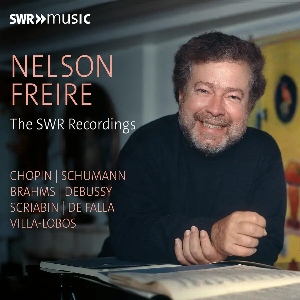
Nelson Freire (piano)
The SWR Recordings
rec. 1968-99
SWR Music SWR19161CD [3 CDs: 174]
The great Brazilian pianist Nelson Freire died at 77 in 2021. He is celebrated here in a collection of satisfying live and studio performances from three decades, kept in the archives of SWR. Some of the performances in the chronologically arranged programme are new even to his extensive discography.
Chopin’s Andante spianato et Grande Polonaise brillante, often treated as slightly inconsequential jeu d’esprit, emerges here with more substance than usual. The opening Andante for solo piano becomes an idyll, ideally phrased and paced, almost rudely interrupted by the orchestral fanfare. The polonaise is not extravagantly brillante because Freire is more focused on the rhythm of the Polish dance, neat and elegant. Chopin’s Second Sonata is another impressive performance. Each lyrical contrasting section in the first three movements compels attention with poise and immaculate line, before the scurrying finale brings a virtuoso close. Scherzo No.4 has all the same qualities, with a hint of added whimsy in the insouciant opening theme, to cap a fine Chopin group.
Schumann’s Fantasy in C major vies with Liszt’s Sonata in B minor as the greatest piano solo work of the 19th century after Beethoven (no arguments, please, except perhaps to plead for the addition of Chopin’s Fourth Ballade). Freire gives a performance befitting that stature. Liszt, for whom Schumann wrote his Fantasy and who played it more than once for the composer, told a pupil that “everyone plays the opening movement in too vigorous a style. It is pre-eminently träumerisch (dreamy).” It sounds as if Freire knew this story. While there is vigour where it is clearly needed, the movement, indeed the piece as a whole, is invested with great poetry, especially in the noble slow finale, played with a cumulative spiritual grandeur. Schumann’s Arabesque, a descent from this level of artistic weight, is imbued with warmth and charm.
Freire had substantial reputation as a Brahmsian.He had never released recordings of the imposing Two Rhapsodies, essential centrepieces of many a Brahms recital, so this account is all the more valuable. In these turbulent high-Romantic effusions, the pianism is often very powerful, as at the fiery opening of the first work, the Rhapsody in B minor. No less so is the second, the Rhapsody in G minor. Freire gives relentless growing intensity to its strange second subject with its insistent and ominous bass line.
More surprising may be the pianist’s very different but quite persuasive manner in the last three pieces on the second disc, Debussy’s Estampes. Pagodes is highly evocative in its quasi-Asiatic moo-painting. La Soirée dans Grenades, which Falla called “the greatest ‘Spanish’ work for piano”, has all the Iberian feeling and colour one could wish for, deeply atmospheric with the habanera rhythm. The rapid toccata-like movement of Jardins sous la pluie requires a virtuoso technique, and Nelson Freire rises to its demands with no compromise in tempo, always with a sense of shape and direction.
The third disc set has three concertante works from the last century, none found elsewhere in Nelson Freire’s discography. Scriabin’s Prometheus – The Poem of Fire is not an essential showcase for the pianist, and collectors would look equally to the names of orchestra and conductor. Suffice to say that the SWR Symphony Orchestra Baden-Baden under Dennis Russell Davies is excellent – this is a very effective Prometheus. Freire, too, delivers all that is required for the solo part.
Falla’s Nights in the Gardens of Spain is another matter – a full concertante piece for piano and orchestra, as evocative as its title. Ermest Bour conducts the same orchestra, and they play very well, with excellent solos. The young Freire is superb in his taxing part, rhythmically alert and athletic. He also truly collaborates with the orchestra in a fine account of a lovely work.
Villa-Lobos’s Mômoprecóce – Fantasy for piano and orchestra, new to me, depicts a carnival parade as seen by a child. There are dance passages and lyrical passages. This essentially light-hearted work has plenty of variety, also in the piano writing. Its invention often suggests the fantasy of its title. Freire clearly enjoys this creation of his compatriot, to which he brings sparkling keyboard agility.
The recordings vary somewhat but are all more than good enough to allow the listener to forget sonics and enjoy the music and the performances. The piano sounds consistently truthful. The adequate booklet notes in German and English cover something of the pianist’s career and say something about most of the works. Most items recorded here have many fine competitive versions in the catalogue, but that is not the point with such an issue. This stands as a very fitting portrait of a very fine pianist.
Roy Westbrook
Previous review: Philip Harrison (February 2025)
Contents
CD1
Frédéric Chopin (1810–1849)
Andante spianato et Grande Polonaise brillante, Op.22 (18301834)
SWR Symphony Orchestra Baden-Baden/Ernest Bour
Piano Sonata No.2 in B-flat minor, Op.35 (1837-1839)
Scherzo No.4 in E major, Op 54 (1842)
CD2
Robert Schumann (1810-1856)
Fantasie in C major, Op.17 (1836-1838)
Arabeske in C major, Op.18 (1839)
Johannes Brahms (1833-1897)
Two Rhapsodies, Op.79 (1879)
Claude Debussy (1862-1918)
Estampes (1903)
CD3
Alexander Scriabin (1872-1915)
Prometheus [The Poem of Fire], Op 60
SWR Symphony Orchestra Baden-Baden/Kammerchor Karlsruhe/Dennis Russell Davies
Manuel de Falla (1876-1946)
Nights in the Gardens of Spain
SWR Symphony Orchestra Baden-Baden/Ernest Bour
Heitor Villa-Lobos (1887-1959)
Mômoprecóce – Fantasy for piano and orchestra
Staatsphilharmonie Rheinland-Pfalz/Theodor Guschlbauer
Recording dates
12 November 1968 (Chopin – Sonata)
17 December 1970 (Chopin – Andante spianato et Grande Polonaise brillante)
18 December 1970 (Falla)
9 November 1979 (Scriabin)
17-18 May 1999 (Villa-Lobos)
8 December 1999 (Chopin – Scherzo, Schumann, Brahms, Debussy)
Buying this recording via a link below generates revenue for MWI, which helps the site remain free




















